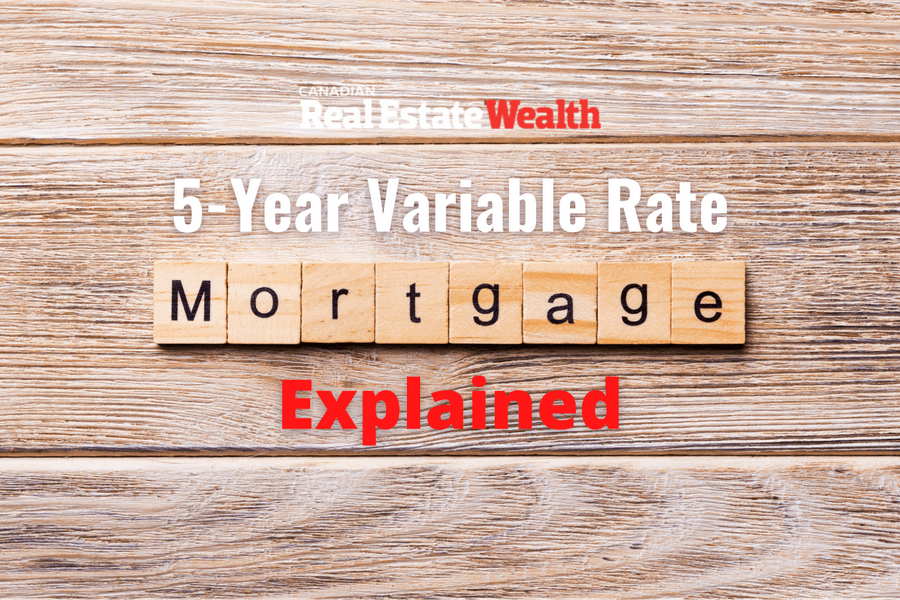Most Canadians take on mortgages that they plan to pay off over the course of decades. Therefore, like any major life decision, the mortgage you choose can make a big difference in your life for years to come. There are dozens of different mortgage products available from numerous different lenders, each with its own benefits and drawbacks. You should never simply choose a mortgage at random without understanding fully what it means for you financially. It’s important that you always on the mortgage you want to choose, even for Canadians working with mortgage brokers. We want to help make those decisions easier for you.
In today’s article, we will cover 5-year variable-rate mortgages, one of the popular mortgage options in Canada, its benefits, its drawbacks and if it may be the right choice for you
The basics
Here are the absolute basics on 5-year variable mortgages: A 5-year variable-rate mortgage is a mortgage contract that matures over a 5-year term before being renegotiated or refinanced. During that 5 years, a regularly updated, or variable, interest rate determines how much interest you pay monthly, while you pay fixed payments. On each of your monthly mortgage payments, a different percentage goes towards interest vs. mortgage principal.
5-year variable rates offer generally lower interest rates at the price of potential instability in interest rates. Whether your mortgage rate goes up or down, you agree to pay the resulting interest costs.
Breaking down the 5-year variable mortgage
The term ‘5-year variable closed mortgage’ actually tells you a lot when you understand what each word actually means. Here are the basic variables for this mortgage:
Mortgage term
Though amortization periods are generally expressed in the long periods of 20-35 years, mortgage agreements actually last a much shorter amount of time. The length of time your mortgage contract lasts for, or its term, is up to you and will affect your mortgage rates and monthly payments. Mortgage terms can be as short as 6 months or as long as 10 years. At the beginning of each term, you negotiate a mortgage rate and monthly payment amount with your lender. At the end of the period, you have the option to renew your mortgage with your lender and renegotiate the terms. If you wish, you may also refinance your mortgage at the end of its term, which means moving your mortgage to another lender who may have better options for you.


Generally, short-term mortgages (5 years or less) offer better rates, but will also require you to renegotiate more often. This allows the bank to adjust your mortgage sooner if it is no longer in their favour. A long-term mortgage, on the other hand, has much more stable albeit higher rates because the bank has to account for any rate changes over the next, say, 10 years. Variable mortgage rates are only available for short-term mortgages.
Short-term mortgages are the more popular choice for Canadians, with 5 years being the most popular mortgage term of all. The 5-year mortgage is attractive as it’s somewhat middle ground between short and long terms. In addition, due to its popularity, lenders offer the most options and most competitive rates in 5-year terms.
Variable vs. fixed mortgages
A fixed-rate mortgage has a fixed interest rate that is determined at the start of each term. While fixed rates do change, you only pay interest at the rate that was decided when you started your term. If you have a 10-year fixed-rate mortgage, for example, you can expect to pay the same rate for the next 10 years without any change.
A variable-rate fluctuates with market conditions. If you have a 5-year variable mortgage, the rate will change often, usually monthly, to keep up with current market conditions.
The primary difference between variable rates and fixed rates is who carries the risk on the loan. For a fixed rate, the bank takes on the risk that should market conditions change, their return in the form of interest may be reduced. The result is that fixed rates offer peace of mind for the borrower in exchange for a generally higher interest rate. For a variable rate, the bank offloads that risk onto the borrower. This means you may be able to enjoy much lower rates for a time, but you may also be forced to pay higher interest if your rate rises.
Generally, in the 5-year term, variable and fixed rates were relatively in sync with one another. However, recently variable interest rates have fallen very low. We will talk more about the current situation and what it means later on.
Open vs. closed mortgages
Another variable in mortgages is the option for open or closed mortgages.
In an open mortgage, you are free to prepay or renegotiate your mortgage at any time, without waiting for the term to end.
With a closed mortgage, you can only renegotiate your mortgage at the end of each term, and you may face penalties for early repayment.
Generally, open mortgages allow you more freedom, and in return, you will pay higher interest rates. For most people who plan to have a steady income and plan to follow their mortgage’s amortization schedule, a close mortgage will suffice. Closed mortgages are generally the more popular choice than open mortgages.
How do current mortgage rates compare?
Let’s compare some current mortgage rates to see how different packages stack up against each other. We will be looking at the major banks as they make up a large majority of Canadian mortgages loans. We will be examining the difference between fixed rates and variable rates, while all other variables remain the same. For these purposes, we will assume a home with a value of $750,000 and 20% down, with an amortization period of 25 years. Actual rates will vary based on circumstances – online mortgage calculators can help you find more specific data for your circumstances.
5-year Fixed mortgage rates
- BMO – 2.79%
- CIBC – 2.79%
- National Bank – 2.79%
- RBC – 2.94%
- Scotiabank – 2.99%
- TD – 2.74%
5-year Variable mortgage rates
- BMO – 1.55%
- CIBC – 1.65%
- National Bank – 1.60%
- RBC – 1.7%
- Scotiabank – 1.75%
- TD – 1.55%
As you can see, fixed rates are currently more than one percentage point lower across the board. That may not seem like much, but over the course of a 25-year mortgage with biannual or even monthly compounding, 1% can add up to a lot of money. While rates between fixed and variable mortgages are rarely the same, they won’t always favour the variable rates. Over the course of a variable mortgage, there may be times when you end up paying higher interest than a fixed mortgage.

Mortgage rates compared. Chart sourced from the CMHC Residential Mortgage Industry Report
How popular are 5-year variable-rate mortgages
The single most popular mortgage in Canada is the 5-year fixed term mortgage. However, due to the bank of Canada’s lowered interest rates during the COVID-19 pandemic, variable interest rates fell very low. As a result, the popularity of variable-rate mortgages has increased. According to the Canada Mortgage and Housing Corporation (CMHC), in Q2 2021, variable mortgages were being chosen by Canadians at higher than average rates. In that period, 40% of new mortgage balances issued had variable rates. Just like the rates themselves, the demand for variable mortgages comes and goes with market conditions. While they are currently seeing increased popularity, that may not be the case as fixed and variable rates come to be more in line with each other in the coming years.
Why or why not consider choosing a 5-year variable-rate mortgage
A 5-year variable-rate mortgage, while not the most popular choice, is still one of the more popular options for a Canadian mortgage. As mentioned above, the 5-year term offers you the benefit of fewer terms over your amortization period, which saves you the work of constant renegotiations seen with sorter terms. In addition, the currently low variable mortgage rate may be appealing, especially when compared with much higher fixed rates. Currently, 5-year variable mortgages have some of the best rates in Canada.
However, there are some reasons to consider not going for a 5-year variable mortgage. One major reason is the changing conditions likely to take place over the next 5 years.

Currently, the variable interest rate is historically low due to the bank of Canada’s lowered overnight rate as a way to assist the economy through the recession. The overnight rate is the primary interest rate set by the Bank of Canada that the major banks use to determine their own prime lending rate. With a historically low overnight rate, they are able to borrow money cheaper and the savings pass on to the borrower through a lower prime rate. This rate is . The current estimate is for the overnight rate to increase as early as the second quarter of 2022, with a predicted increase from 0.5% to up to 1.5% into 2023. Already, fixed rates have begun rising with the increase in government bond yields and pressure is being put on the central bank to increase rates to slow the rate of inflation.
Variable mortgages are at their best when you can be confident in persistent low rates, right now that is not the case. While the fixed-rate mortgages may be more expensive now, that picture significantly changes over the next 5 years.
This doesn’t mean you should reject a variable mortgage outright, as they are a valid option. Consider opting for a variable mortgage that allows you to lock into a fixed rate whenever you want. This will allow you to settle on one rate should the market fluctuations prove too rich for your risk capacity.
Corben joined CREW as a relative newcomer to the field of real estate and has since immersed himself and learned from the experts about everything there is to know on the topic. As a writer with CREW, Corben produces informative guides that answer the questions you need to know and reports on real estate and investment news developments across Canada. Corben lives in Guelph, Ontario with his partner and their two cats. Outside of work, he loves to cook, play music, and work on all kinds of creative projects. You can contact Corben at corben@crewmedia.ca or find him on Linkedin at https://www.linkedin.com/in/corbengrant/.









